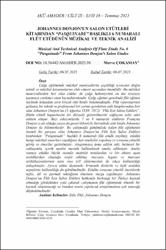| dc.contributor.author | Çokamay, Merve | |
| dc.date.accessioned | 2023-08-31T07:21:54Z | |
| dc.date.available | 2023-08-31T07:21:54Z | |
| dc.date.issued | 26.07.2023 | en_US |
| dc.identifier.citation | Çokamay, M. (2023). JOHANNES DONJON'UN SALON ETÜTLERİ KİTABINDAN “PASQUINADE” BAŞLIKLI 6 NUMARALI FLÜT ETÜDÜNÜN MÜZİKAL VE TEKNİK ANALİZİ . Afyon Kocatepe Üniversitesi Akademik Müzik Araştırmaları Dergisi , IX (18) , 429-450 . | en_US |
| dc.identifier.uri | https://dergipark.org.tr/tr/pub/amader/issue/79111/1293568 | |
| dc.identifier.uri | https://hdl.handle.net/11630/10387 | |
| dc.description.abstract | Çalgı eğitiminde müzikal materyallerin çeşitliliği icracının doğru teknik ve müzikal kazanımlarını elde etmesi açısından önemlidir. Bu müzikal materyallerden biri olan etütler de çalgı hakimiyetini en üst seviyeye taşımaya yardımcı olan kaynaklardandır. Çalgı eğitimi genelinde flüt eğitimi özelinde kolaydan zora birçok etüt kitabı bulunmaktadır. Flüt repertuarının gelişmiş bir teknik ve profesyonel bir yorum gerektiren etüt kitaplarından biri olan Johannes Donjon’un (5 Ağustos 1839- 1912) “Flüt İçin Salon Etütleri”, flütün teknik kapasitesini üst düzeyde gösterilmesini sağlayan sekiz adet etütten oluşur. Bazı edisyonlarda 7 ve 8 numaralı etütlerin François Donjon’a ait olduğu yazsa da genel itibariyle literatürde etüt kitabı Johannes Donjon ile bilinmektedir. Bu çalışmada günümüzde halen flüt eğitiminin önemli bir parçası olan Johannes Donjon’un Flüt İçin Salon Etütleri kitabından “Pasquinade” başlıklı 6 numaralı flüt etüdü seçilmiş, etüdün hangi müzikal unsurları taşıdığına dair analizler yapılmış ve icrasına yönelik görüş ve öneriler getirilmiştir. Araştırmaya konu edilen etüt, betimsel bir yaklaşımla, içerik analizi metodu kullanılarak analiz edilmiştir. Analiz sonucu etüdün büyük oranda onaltılık notalardan ve bir oktavı aşan aralıklardan oluştuğu tespit edilmiş, staccato, legato ve marcato artikülasyonlarının yanı sıra tril süslemesinin de sıkça kullanıldığı anlaşılmıştır. Ayrıca etütte diyatonik- kromatik dizilerin ve üçlü aralıkta arpejlerin kullanıldığı da görülmektedir. Etüdün icrasına yönelik önerilerde nefes, dil ve parmak tekniğinin önemine vurgu yapılmıştır. Johannes Donjon’un Flüt İçin Salon Etütleri hakkında herhangi bir Türkçe kaynak olmadığı görüşünden yola çıkarak çalışmanın flüt eğitiminde önemli bir kaynak oluşturacağı ve bundan sonra yapılacak araştırmalara ışık tutacağı düşünülmektedir. | en_US |
| dc.description.abstract | The variety of musical materials in instrument training is important for the performer to achieve the right technical and musical gains. Etudes, which are one of these musical materials, are among the resources that help to maximize instrument mastery. There are many etude books from easy to difficult in flute education in general and flute education in particular. Johannes Donjon's (August 5, 1839-1912) "Salon Etudes for Flute", which is one of the etude books of the flute repertoire that requires an advanced technique and a professional interpretation, consists of eight etudes that show the technical capacity of the flute at a high level. Although some editions state that the etudes numbered 7 and 8 belong to François Donjon, the etude book is generally known as Johannes Donjon in the literature. In this study, flute etude number 6 titled "Pasquinade" from Johannes Donjon's Salon Etudes for Flute, which is still an important part of flute education today, was selected, the musical elements of the etude were analyzed, and opinions and suggestions were made regarding its performance. The etude was analyzed using a descriptive approach and content analysis method. As a result of the analysis, it was determined that the etude consists mostly of hexadecimal notes and intervals exceeding one octave, and it was understood that staccato, legato and marcato articulations as well as trill ornamentation were frequently used. It is also seen that diatonic-chromatic scales and arpeggios in the triple interval are used in the etude. The suggestions for the performance of the etude emphasize the importance of breath, tongue and finger technique. Based on the view that there is no Turkish source on Johannes Donjon's Salon Etudes for Flute, it is thought that the study will constitute an important source in flute education and will shed light on future research. | en_US |
| dc.language.iso | tur | en_US |
| dc.publisher | Afyon Kocatepe Üniversitesi | en_US |
| dc.identifier.doi | 10.36442/AMADER.2023.98 | en_US |
| dc.rights | info:eu-repo/semantics/openAccess | en_US |
| dc.subject | Etüt | en_US |
| dc.subject | Flüt | en_US |
| dc.subject | Johannes Donjon | en_US |
| dc.subject | Etude | en_US |
| dc.subject | Flute | en_US |
| dc.subject | Johannes Donjon | en_US |
| dc.title | Johannes Donjon'un Salon Etütleri kitabından “Pasquınade” başlıklı 6 numaralı flüt etüdünün müzikal ve teknik analizi | en_US |
| dc.title.alternative | Musical and technical analysis of flute etude no. 6 "Pasquinade" from Johannes Donjon's Salon Etudes | en_US |
| dc.type | article | en_US |
| dc.relation.journal | Afyon Kocatepe Üniversitesi Akademik Müzik Araştırmaları Dergisi | en_US |
| dc.department | Afyon Kocatepe Üniversitesi | en_US |
| dc.authorid | 0000-0002-9626-6238 | en_US |
| dc.identifier.volume | 9 | en_US |
| dc.identifier.startpage | 429 | en_US |
| dc.identifier.endpage | 450 | en_US |
| dc.identifier.issue | 18 | en_US |
| dc.relation.publicationcategory | Makale - Ulusal Hakemli Dergi - Başka Kurum Yazarı | en_US |



















